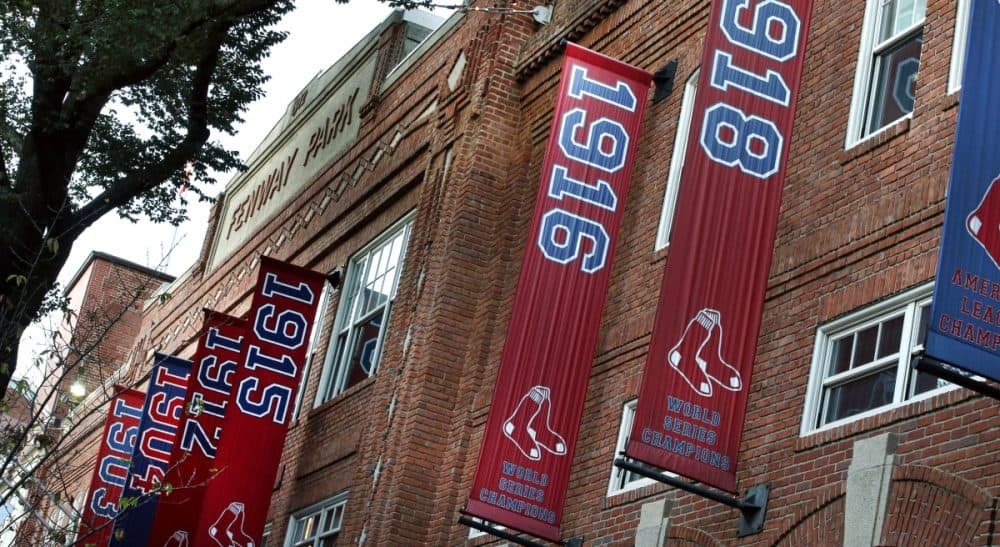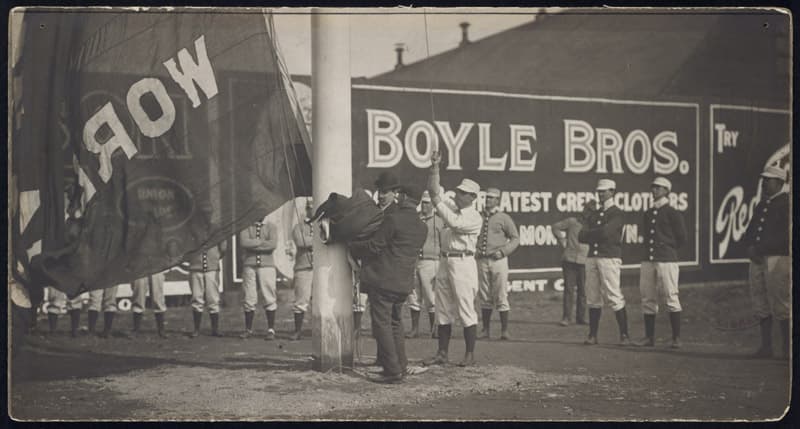Advertisement
The Lost Banner Of 1904: The Red Sox Have Won More Championships Than You Think

When the Red Sox raise the 2013 world championship banner during their home opener at Fenway Park this Friday, it will mark just the eighth time in the team’s colorful 114-year history that they’ve been able to do so. But what most Boston fans fail to realize is that the Sox have been unfairly shortchanged when it comes to the number of championships major league baseball is officially willing to recognize.
That’s because the Red Sox are really nine-time champs, not the eight-time as popularly advertised. Why the disparity? To answer this question, one needs to go back to the murky early years of the 20th century when the Sox, then known as the Americans, represented the upstart American League, which came into existence in 1901 under the visionary leadership of a former sportswriter turned baseball magnate named Byron Bancroft “Ban” Johnson. “The American League will be the principal organization in the country within a very short time,” he vowed.
Not many took such talk seriously. The National League, formed during the country’s centennial anniversary year of 1876, had been the game’s premier showcase of hardball talent for decades. So laughable was the idea that the fledgling A.L. had become somehow the athletic equivalent of the senior circuit that the N.L. had little problem in 1903 with approving a playoff series pitting their league champion, the Pittsburgh Pirates, with their opposite number in the A.L., the Americans, for the baseball championship of the world.
[This team] deserves its place in the sun alongside last year’s Red Sox edition in the celebrated annals of the sport.
Of course, history records that the Americans defeated the Pirates in that inaugural World Series, five games to three in a best of nine affair. Future Hall of Fame hurler Cy Young, a 28-game winner on the season, accounted for two of those victories as he limited the opposition to under two runs a game. Not bad for an overweight 36-year-old pitcher on the supposed downward slope of his career. Young also showed his versatility off the playing field by doubling as a ticket seller during the series. “It was the greatest thing for baseball known in years,” gushed the Boston Herald.
The Americans would repeat as A.L. champions in 1904 but returning to the World Series proved too problematic. Infuriated that the N.L. had been humiliated the year before, John T. Brush, the bombastic owner of the N.L. champion New York Giants, steeled himself not to make the same mistake the Pirates had. He was also furious that Johnson had earlier approved of putting a rival A.L. ball club in New York City to compete head-on with the Giants for the same hard-earned baseball dollars of the viewing public. Brush was well justified in his anger. For that new team in question became the New York Yankees and they would come to dominate the affections and pocketbooks of the Big Apple baseball faithful in the decades ahead to the point where the Giants were forced to leave the city, along with the Brooklyn Dodgers, for the greener financial pastures of the West Coast following the 1957 regular season.

So instead of facing off against the Americans in the 1904 postseason and possibly suffering another embarrassing defeat for his league, Brush decided to opt his team out of the World Series. Only he didn’t put it that way. Never a man to concede a defeat or weakness, Brush manufactured an elaborate cover story to justify his curious action. “There is nothing in the constitution or playing rules of the National League which requires its victorious club to submit its championship honors to a contest with a victorious club in a minor league,” he said.
Brush’s dugout manager, the ever pugnacious John J. “Muggsy” McGraw, who once proclaimed there was “but one game and that game is baseball,” provided further backup. “Why should we play this upstart club, or any other American League team, for any postseason championship,” he bellowed.
Not even the polite blandishments of new 29-year-old Americans owner John I. Taylor, the spoiled son of Civil War veteran and Boston Globe publisher Charles H. Taylor, could sway the stubborn minds of the Giants brain trust. “As the Boston club to-day won the championship of the American League,” Taylor wrote McGraw in early October, “I challenge your club to play for the championship of the world.”
Needless to say, the Giants refusal to play Boston did not go down well in New England or elsewhere in the country where baseball-hungry fans gathered. Brush was singled out as behaving in a craven and unsportsmanlike manner, but he didn’t seem to mind. “All this ran off Mr. Brush like water off a duck’s back,” McGraw explained. “He was a man of great determination, firm as a stone wall.”
The latter can be said of the official baseball record book’s unwillingness to acknowledge Boston as the 1904 world champions. Through no fault of their own, this team, which featured the splendid fielding of Hall of Fame third baseman Jimmy Collins and the otherworldly mound heroics of Young, deserves its place in the sun alongside last year’s Red Sox edition in the celebrated annals of the sport.
As the venerable Sporting News put it at the time, Boston had become “World Champions by default.”
Time to raise another championship banner in Fenway to right a great wrong.
Related:
